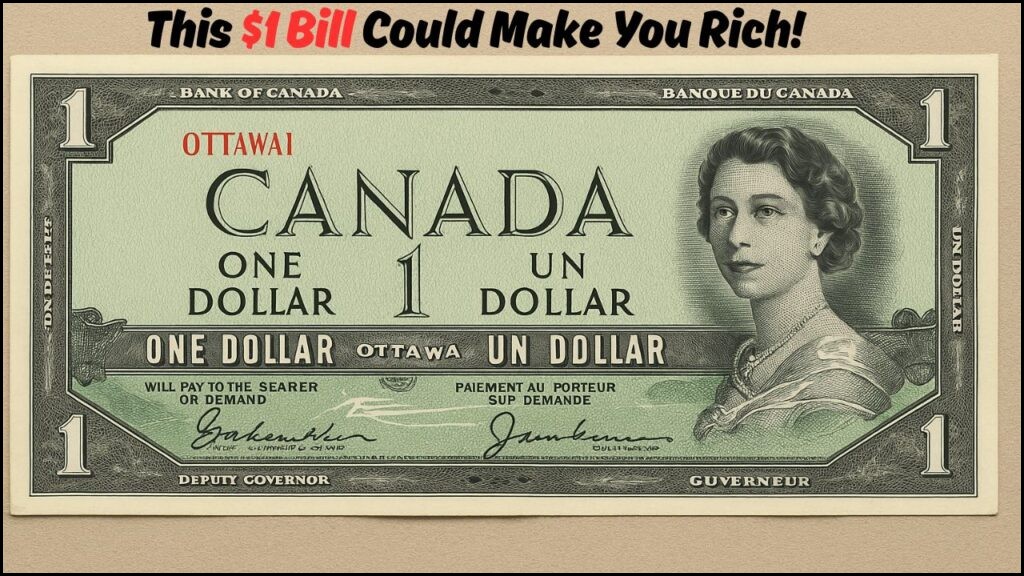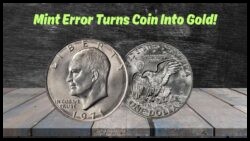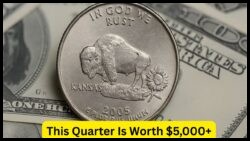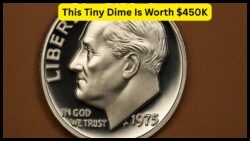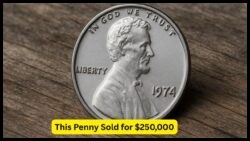$1 Bill – If you have an old Canadian $1 bill lying around, you might be sitting on a hidden treasure. Known as the “Devil’s Face” $1 bill, this rare note from 1954 is making headlines again as collectors are paying thousands of dollars to get their hands on it. While many people disregard old currency as outdated or worthless, this particular bill has a unique history — one that includes controversy, a printing recall, and a striking visual illusion that has fascinated collectors for decades. Whether you’re a numismatist (currency collector) or just someone who stumbled upon an old box of keepsakes, it’s worth learning what makes this piece of paper so valuable in 2025.
What Is the “Devil’s Face” $1 Bill?
At first glance, the 1954 Canadian $1 bill looks like any other vintage currency note. But look closely — very closely — at the portrait of Queen Elizabeth II on the left side of the note. Behind her right ear, hidden in the shadows of her hair, lies an eerie image that caused public outrage at the time.
Key Identifying Features:
- Portrait of a young Queen Elizabeth II facing right
- Dark area in her hair appears to show a sinister face or figure — hence the name “Devil’s Face”
- Printed by the Bank of Canada in 1954
- “BANK OF CANADA – BANQUE DU CANADA” prominently printed
- Green color tone with serial numbers in black or red
This optical illusion was enough to spark concerns and conspiracy theories, leading to an official redesign.
Why Was It Controversial?
The controversy began shortly after the bill’s release. Some Canadians claimed they could see the devil’s face in the Queen’s hair — a demonic-looking image staring back from the shadows. Although the resemblance was accidental and unintentional, the imagery spooked enough people that the Bank of Canada had to take action.
Reasons Behind the Recall:
- Public complaints about “satanic imagery”
- Religious and conservative groups demanded the note be pulled
- Officials feared the illusion would undermine public trust
- A new portrait was quickly designed to replace the original
- All future bills used a modified version without the eerie image
How Much Is the Devil’s Face $1 Bill Worth in 2025?
The value of the 1954 Devil’s Face $1 bill depends on several factors: condition, serial number, and whether it has been circulated. In mint or uncirculated condition, collectors are offering top dollar — in some cases, over R20,000 ($1,100+).
Estimated Value Table (2025):
| Condition | Estimated Value (ZAR) | Estimated Value (USD) |
|---|---|---|
| Circulated | R300 – R1,200 | $16 – $65 |
| Fine | R1,500 – R4,500 | $80 – $240 |
| Extremely Fine | R5,000 – R8,000 | $270 – $420 |
| Uncirculated | R10,000 – R22,000+ | $540 – $1,200+ |
| Star Notes | R25,000+ | $1,400+ |
Collectors value these bills even more if the serial numbers are rare or if the note was printed by the British American Bank Note Company (BABN) instead of the Canadian Bank Note Company (CBN).
How to Check if You Have a Real Devil’s Face Note
If you suspect you might have a valuable 1954 $1 bill, it’s important to verify its authenticity before rushing to sell it.
Here’s how to confirm:
- Look for the year 1954 printed on the note
- Inspect the Queen’s portrait closely — does the shadow in her hair form a strange face?
- Check for the serial number (should be on both sides)
- Determine the printing company: BABN versions are rarer
- Avoid notes labeled “Modified Portrait” — these were reissued to fix the image
You can also consult a certified currency expert or get the note graded by a professional service to determine its market value more precisely.
Where Can You Sell a Devil’s Face $1 Bill?
With the surge in demand for rare currency in recent years, there are now several platforms where sellers can cash in on this collector’s item.
Popular Selling Options:
- eBay – Global collector base, quick bidding wars
- Local coin shops – Great for in-person authentication and instant cash
- Facebook Marketplace – Good for quick local sales
- Specialized numismatic auctions – Best for high-grade notes
- Collector forums and Reddit – Engage with experts and serious buyers
If your bill is in pristine condition or has a special serial number, consider selling it at auction where bidding can drive the price far above its listed value.
Why the Devil’s Face Bill Is Gaining Popularity Again
The rise of vintage collecting, online auctions, and TikTok/YouTube trends have all contributed to a renewed interest in rare currency. The 1954 Devil’s Face bill checks all the boxes for collectors: it’s historical, rare, a bit creepy, and officially recalled. That kind of story isn’t just valuable — it’s viral.
Current Trends Driving Up Prices:
- Increased interest in Canadian royal memorabilia
- Currency collectors hunting discontinued designs
- TikTok & YouTube videos showcasing rare banknotes
- Gen Z investing in vintage items with unique stories
- Public fascination with “hidden messages” in official prints
Some collectors are even framing these bills or using them in documentaries and educational displays.
The 1954 “Devil’s Face” $1 bill is more than just money — it’s a fascinating piece of Canadian history. What started as an artistic shadow turned into one of the most mysterious and valuable printing mistakes in the world of paper currency. If you own one, you could be holding a collector’s dream. Whether you choose to sell it or frame it, the story behind this bill will only make it more valuable with time.
FAQs
Q1. What makes the 1954 $1 bill so rare?
It contains an accidental “devil’s face” image in the Queen’s hair, which led to a redesign and recall.
Q2. How can I check if my bill is the Devil’s Face version?
Look for the 1954 date and the shadowy face behind Queen Elizabeth II’s ear in her hair.
Q3. How much can I sell a Devil’s Face $1 bill for?
Depending on its condition, it can be worth anywhere from R300 to R25,000 or more.
Q4. Where can I sell this bill?
Online platforms like eBay, local coin dealers, numismatic auctions, and collector forums.
Q5. Are modified portrait bills from 1954 valuable too?
Not as much — the modified version removed the “devil’s face,” making it less rare.

